119 Products
-
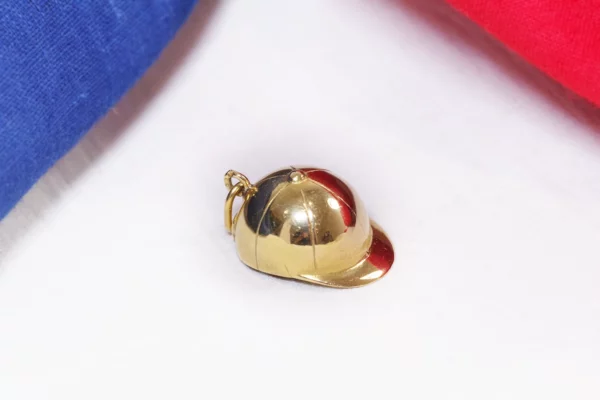
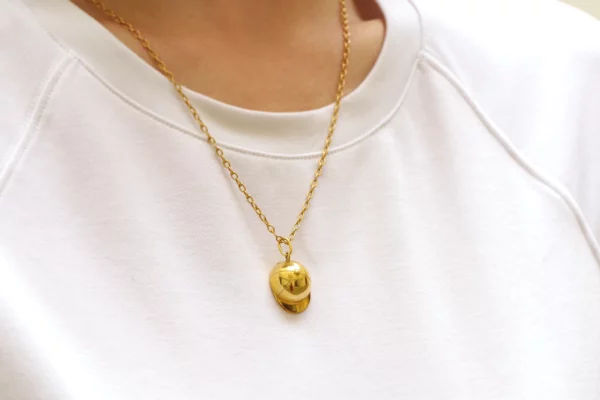 400,00€
400,00€Riding helmet pendant in 18 karat yellow gold (750). This pendant represents an equestrian helmet, also known as a “toque,” though it is increasingly referred to as a helmet. It is decorated with grooves. The helmet is the protection that riders wear on their heads for horseback riding. Vintage pendant, circa 1980, France. Sport jewelry collection
Hallmarked with an eagle’s head (french state hallmark for 18 karat gold)
Height (including bail): 28 mm
Width: 15 mmCondition: signs of wear
Weight: 3.82 gr
*The antique gold chain is not sold with the jewel*
See our antique chains -
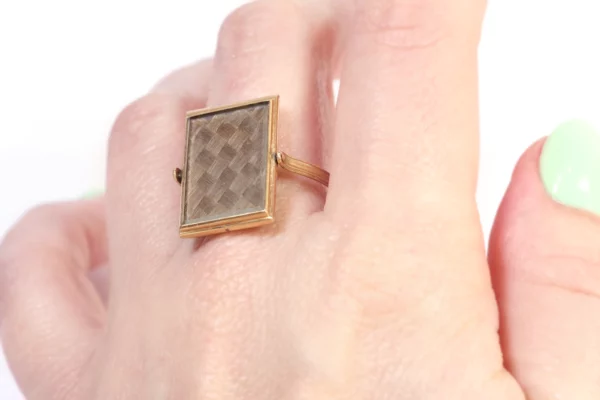
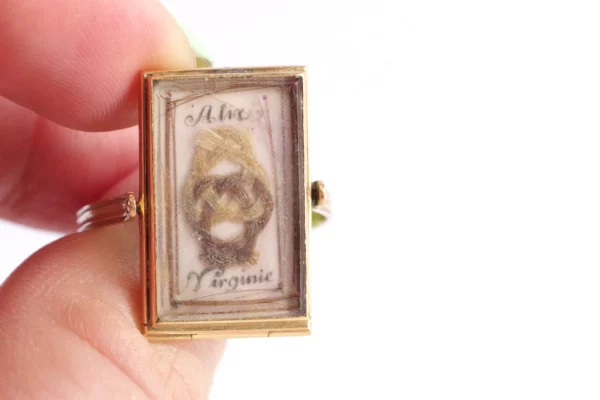 2000,00€
2000,00€Georgian sentimental swivel ring in 18k gold. This georgian ring features a rectangular swivel bezel, with one side containing two intertwined locks of hair—one blonde, the other brown—alongside the names “Alix” and “Virginie,” and the other side displaying a flatly braided hair rectangle. A sentimental ring representing two lovers from the early 19th century, France.
Hallmark: rooster facing right (1798-1809, France)
Ring size: 60 EU or 9 US
Swivel bezel dimensions: 21 x 13 mm
Condition: wear scratches, slight dent inside the band, some hair detached.
Weight: 3.68 gr
Sentimental jewelry, often known as mourning or lover’s jewelry, was particularly popular during the 18th and 19th centuries. These pieces frequently incorporated personal elements like hair, inscriptions, or miniature portraits, serving as intimate mementos of loved ones. Hairwork, in particular, was a cherished practice, symbolizing enduring connections and memories.
-
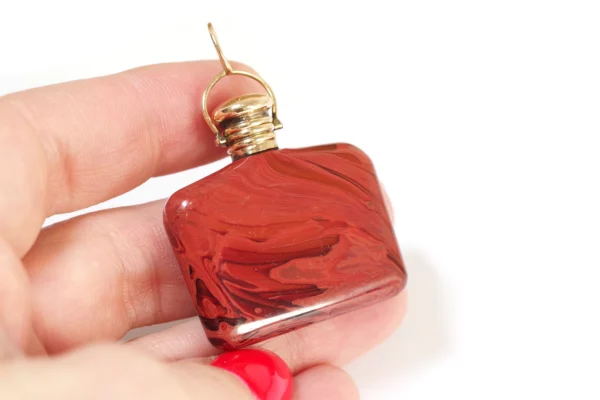
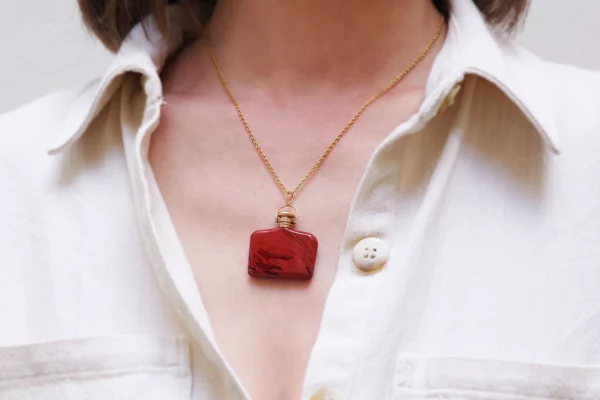 1200,00€
1200,00€Antique perfume bottle pendant in glass and 18 karat (750) rose gold. Glass perfume bottle imitating red jasper. The upper part of the bottle is made of rose gold, a lid opens onto a small glass stopper and a mobile clasp allows it to be hung as a pendant. Antique pendant from the early 19th century, France.
Ram head hallmark (active between 1819-1838, french state hallmark for 18 karat gold)
Height: 4.5 cm
Width: 3.2 cmCondition: scratches from use
Weight : 12.11 gr
*The antique gold chain is not sold with the jewel*
See our antique chains -
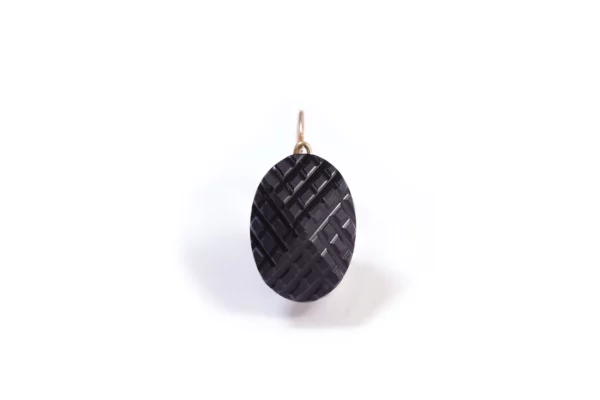
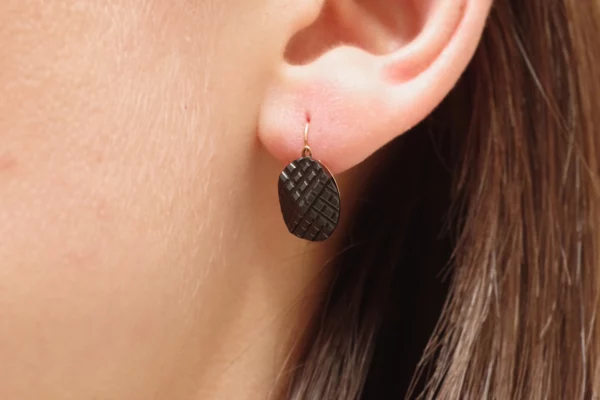 140,00€
140,00€Single black dormeuse earring in 18 karat rose gold (750/1000). Unique dormeuse earring decorated with black glass imitating jet, known as “verre de Paris.” The glass is pointed and decorated with a grid pattern. Antique single earring, circa 1830, France. Unmatched piece.
Hallmark: ram’s head (1819-1838, french state hallmark for 18 karat gold)
Height: 18 mm
Width: 9 mmCondition: wear and tear. This earring is sold individually.
Weight: 1.31 gr
-
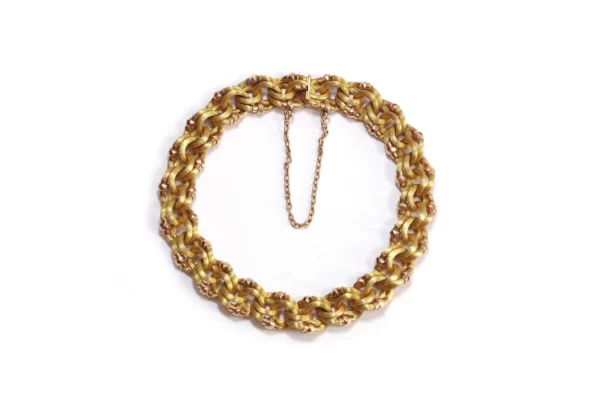
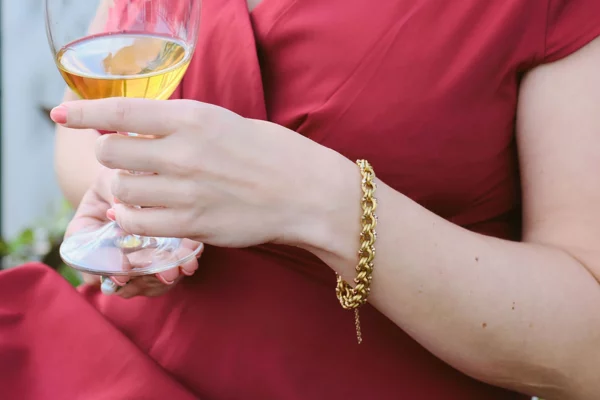 2000,00€
2000,00€Antique Antillean bracelet in 18k yellow gold. Antique bracelet composed of twisted links forming grooved rings decorated with faceted spherical motifs. Antique bracelet from the Antilles, circa 1880, France.
Hallmarks: eagle’s head, rhinoceros head, and maker’s mark.
Length: 19.5 cm
Width: 10 mmNote: the clasp is secured by an 18 karat gold safety chain.
Condition: minor wear and tearWeight : 17.71 gr
*The antique box is not sold with the jewel*
Further information : Traditional jewelry is still worn in the Antilles for special occasions and cultural events. This regional Antilles jewelry is characterized by elaborate motifs such as twisted gold wires, vine leaves, forçat mesh, fluting, “gros sirop” mesh, gold wire spirals, etc.
-
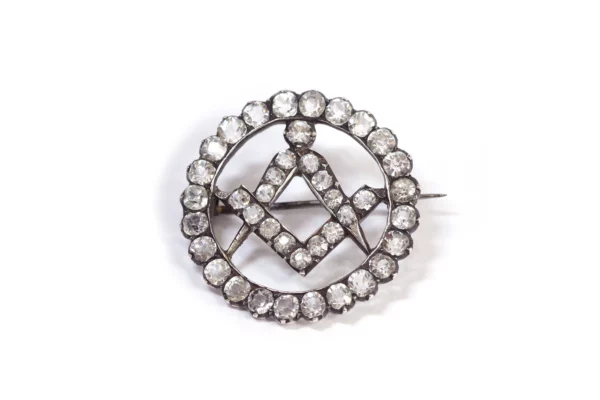
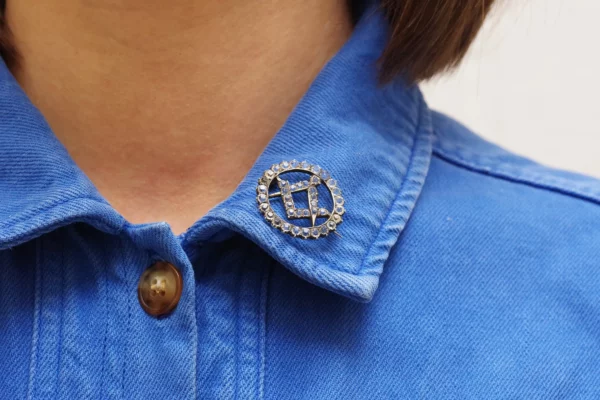 450,00€
450,00€Antique Masonic brooch in silver. Masonic brooch featuring the Square and Compasses within a circle, set with rhinestones. The combination of the Square and Compasses forms a square within the circle, symbolizing matter surrounded by the spiritual. The reunion of body and spirit can be supported by the quest for the squaring of the circle. In Masonic believes, the Compass symbolizes spiritual measurement and the individual’s ability to keep their actions within the bounds of what is right and appropriate. It also represents the capacity for self-assessment and improvement. The Square, on the other hand, represents the virtue of living a straight and balanced life, while respecting moral and ethical laws. Antique brooch, circa 1900.
Swan hallmark (french state hallmark for silver)
Diameter: 26 mm
Condition: signs of wear
Weight: 3.76 gr
*The antique gold chain is not sold with the jewel*
-
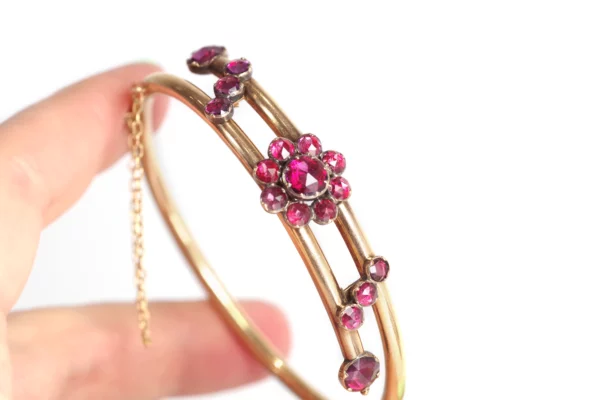
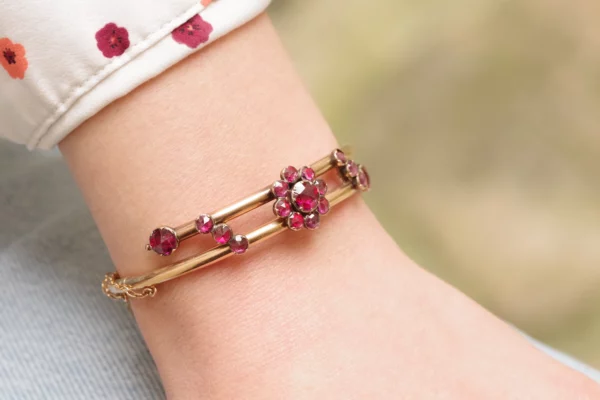 2600,00€
2600,00€Perpignan garnet bangle bracelet in 18 karat rose gold. Bangle bracelet featuring a rose gold hollow stem, the ends decorated with garnets. In the center of the bracelet, a flower formed of 9 round garnets, and on the sides a barrette motif formed of 3 garnets. The stones are “Perpignan” cut, a rose cut with a flat base. They have a beautiful raspberry-pink-red color, typical of Perpignan garnets. The garnets are mounted on foil and in closed setting. The setting is delicately decorated with triangular V-shaped figures on the edges, and the bezel backgrounds are domed. The clasp is a box-latch secured by a chain. Antique rush bracelet, circa 1880, Southeastern France.
Horsehead hallmarks (1838-1919, french state hallmark for 18 karat gold)
Center width: 14 mm
Inside length: 16.5 cm
Inside dimensions: 5 x 5.5 cmCondition: slight wear scratches, small dents behind two bezels, a inner crack in one of the garnets.
Weight : 9.96 gr
-
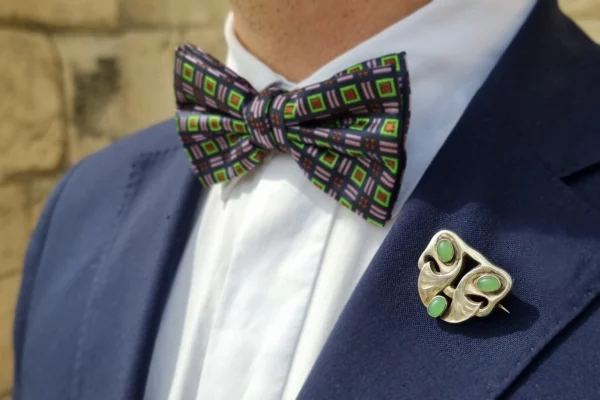
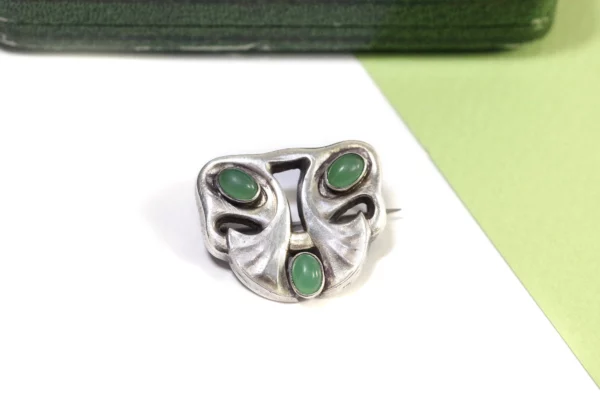 490,00€
490,00€Jugendstil silver brooch. Brooch in silver set with light green glass cabochons. Art Nouveau brooch, Jugendstil period, circa 1900, School of Pforzheim, Germany.
Registered hallmark and weevil hallmark.
Dimensions: 30 x 25 mm
Condition: scratches from use
Weight : 7.34 gr
*The antique box is not sold with the jewel*
Learn more: The city of Pforzheim specializes in the creation of Jugendstil jewelry (Art Nouveau movement in Germany), drawing inspiration from French jewelry, most often crafted in silver and set with cabochon semi-precious stones. These jewels were more accessible than the precious material jewelry of the French Art Nouveau period. Theodor Fahrner, Georg Kleemann, and the firm Carl Hermann & Speck are the most significant creators of this movement in Germany.
-
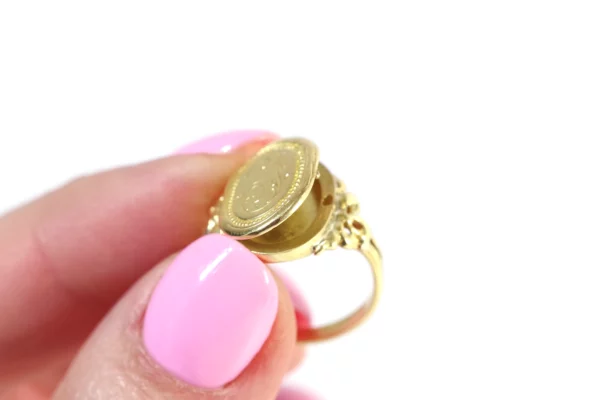
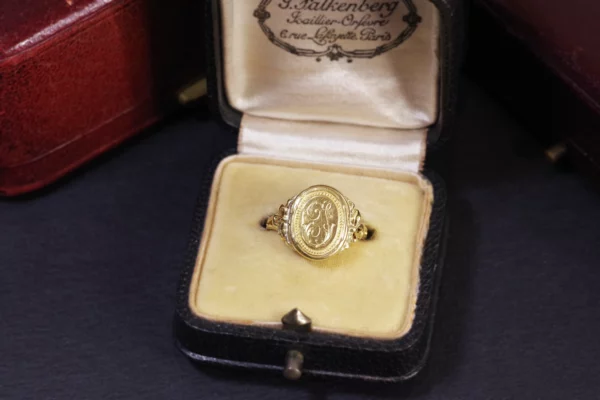 1250,00€
1250,00€Gold signet secret ring in 18 karat gold. Opening secret ring, decorated on the plate with the letter J in calligraphy. The ring opens to reveal a secret compartment that can conceal a photo or souvenir. The shoulders of the ring are delicately decorated with a ribbon motif. Antique sentiment ring, late 19th century. Owl hallmarks (18k gold)
Finger size: 52 EU or 6 US (can be changed)
Tray dimensions: 13 x 11 mm
Inner cavity dimensions: 11 x 8 mm
Condition: slight wear scratches, compartment closes well
Weight : 3.76 gr
*The antique box is not sold with the jewel*
-
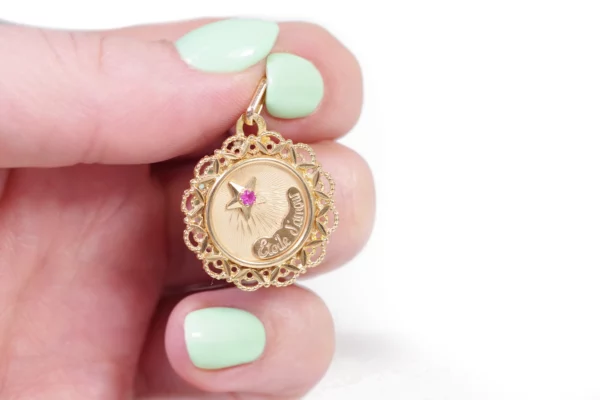
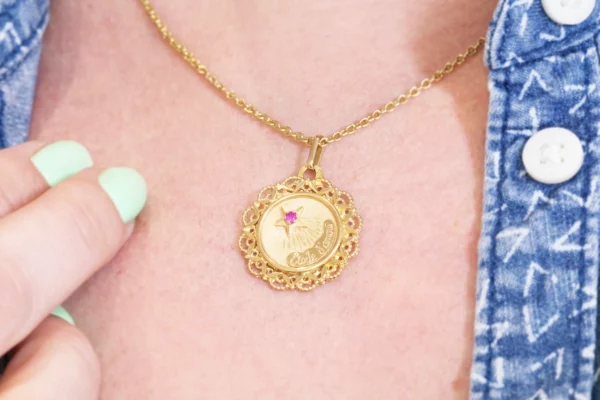 530,00€
530,00€Étoile d’Amour medal in 18 karat rose gold (750). Medal from the 1960s, decorated with a shooting star set with a flying synthetic ruby above the words “Étoile d’amour” (Star of Love). The reverse of the medal is not engraved. Vintage sentimental jewelry, France, 60’s.
Eagle head hallmark (french state hallmark for 18 karat gold) and goldsmith’s hallmark.
Height with bezel: 30 mm
Width: 21 mmWeight: 1.53 gr
*The antique gold chain is not sold with the jewel*
See our antique chains -
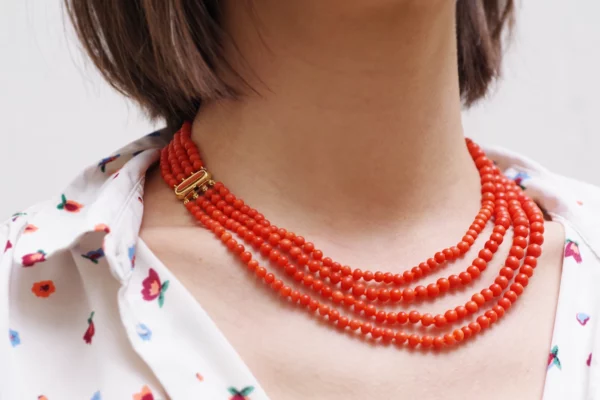
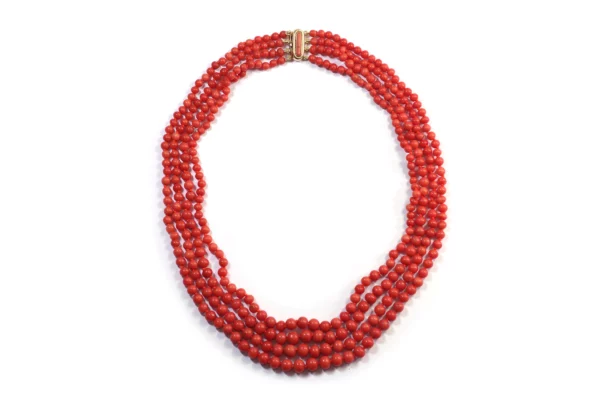 1800,00€
1800,00€Four rows coral beads necklace with a clasp in 18 karat gold. Antique necklace with four rows of coral beads from small to large pearls. The color of pearls is orange with shades of light to dark orange. The necklace closes with a large ratchet box clasp set with an elongated coral cabochon. Necklace circa 1940. Owl hallmark.
Length: 43 cm
Note: the necklace has been entirely threaded with new silk threads.
Weight : 61.66 gr
Gemological point: Coral is a gem of organic origin. Only the branched calcareous trunks of certain corals are used in jewellery. Its colour is due to organic pigments close to carotene: varying from blood red to white, passing by the pink “angel skin”. Currently, most coral species are protected under CITES, the Convention on International Trade in Endangered Species of Wild Fauna and Flora.
-
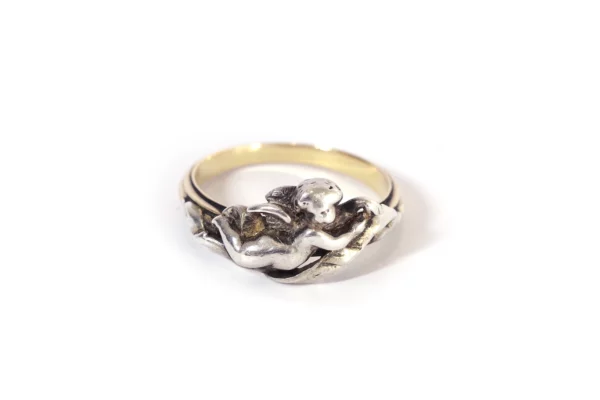
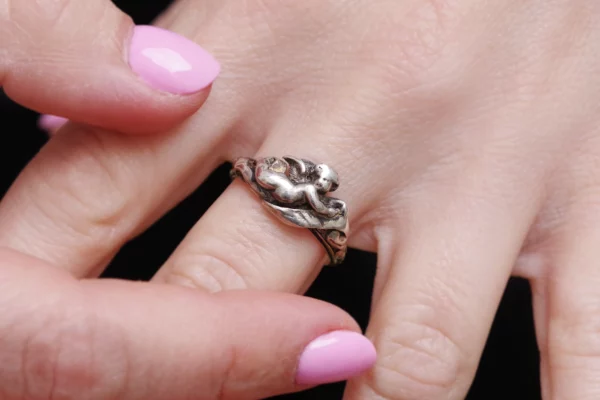 2900,00€
2900,00€Fannière Frères angel ring in 18 karat gold and silver 800. Antique ring with charming decoration, depicting an angel holding a ribbon. The angel is in silver, mounted on a gold ring soberly decorated with fine striations. The ring is signed on the inside. Ring made by the Frères Fannière, famous 19th-century silversmiths, circa 1870, France.
Fannières Frères signature, trace of eagle head, owl and swan hallmarks
Finger size: 55 UE or 6.75 US (can be changed)
Angel size: 10 x 16 mm
Condition: light usual scratches, patinated silver
Weight: 4.68 g
More information : The company was founded in 1839 by François-Auguste Fannière (1818-1900) and François-Joseph-Louis Fannière (1820-1897), nephews and students of goldsmith Fauconnier. At once designers, sculptors, chiselers and manufacturers, they worked for leading Paris silversmiths such as Baugrand, Duron, Wiese, Odiot, Froment-Meurice and Christofle, then under their own name from 1862. The company was taken over in 1900 by François-Joseph-Louis Fannière’s son, then by Fernand Poisson. Few pieces of jewelry have survived.
*The antique box is not sold with the jewel*
